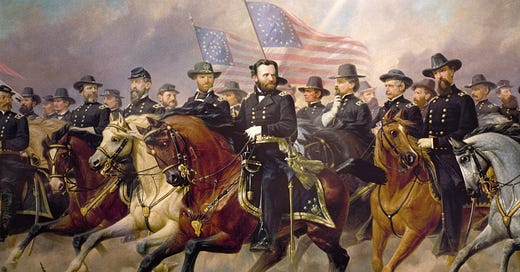Historians generally agree that Ulysses S. Grant was a crummy U.S. president but a sterling military man. During the Civil War, he helped bring the country together, squashing the South’ desire to discount equality.
So I was surprised to read up on this historical footnote that happened 162 years ago this past week—on December 17, 1862. We all know of the long, disgusting history of antisemitism in the world, but I didn’t know Grant was part of its story.
General Order No. 11 was issued by General Grant that day during the Vickburg campaign, when Grant’s Union troops faced off against Lieutenant General John Pemberton for control of the last Confederate-held area, in Mississippi along the Mississippi River.
Grant aimed to curb widespread smuggling and corruption in the cotton trade, which he believed was primarily run by Jewish traders. He perceived Jewish merchants as particularly problematic, violating regulations and bribing officers, and he also was not sold on the suggestion from his father, Jesse Grant, to establish a profit-sharing scheme with Jewish traders. It seems he felt betrayed by his father for being involved at all in a trade he despised and that he felt was not making the war any easier to win.
While the order started out calling for Jews not to be involved in the trade anymore, it shifted more radically to calling for the expelling of all Jews from his military district in Tennessee, Mississippi, and Kentucky.
At Holly Springs, Mississippi, Jews were forced to leave on foot after Grant's order. Some walked as far north as 40 miles while others were saved from having to leave by the timing of an arrival by Confederate troops. In Paducah, Kentucky, thirty Jewish families were roughly expelled and rounded up onto a steamer on the Ohio River.
Some of the merchants from Paducah sent a letter to President Abraham Lincoln, which launched a series of protests from Jewish leaders, Congress, and the media. Lincoln countermanded General Order No. 11 on January 4, 1863.
But by then, the damage was already done, to both the Jews of the area and Grant’s general humanitarianism vibe. He made the mistake so many racists make by having his order include all Jews rather than the few who were actually engaged in corrupt practices.
In 1868, the order would be used against Grant while running as a Republican for U.S. president. But in the end, he apologized to the Jewish people and most of them voted for him in his winning campaign. He soon actually became a “great friend of the Jews,” appointing more Jewish people to federal offices than any prior president and condemning European atrocities against Jews as part of an impressive—for such a famed war man—humanitarian agenda.





